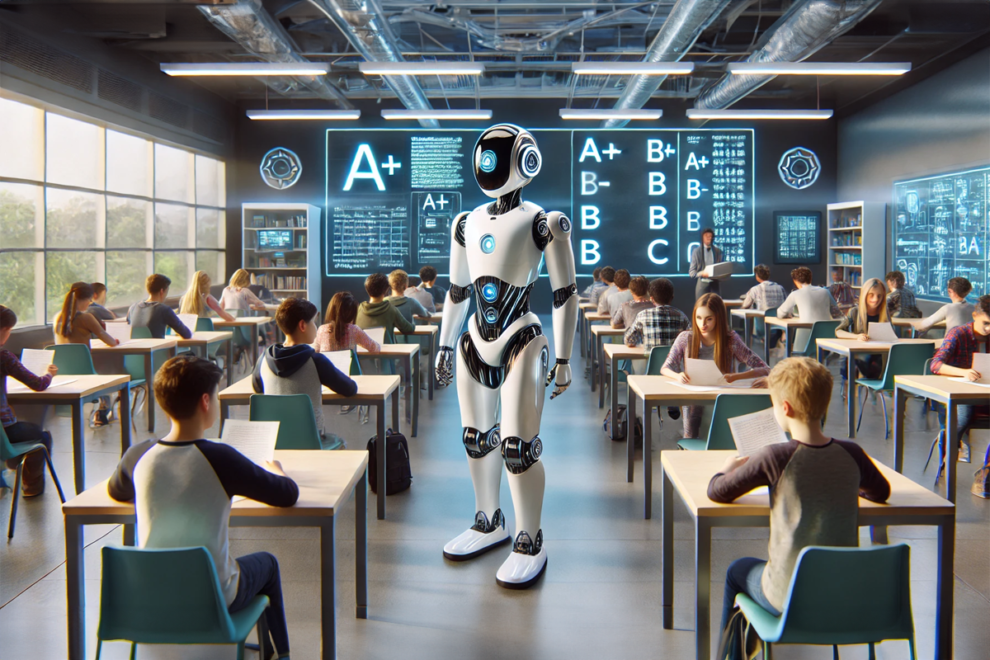In the fastest-evolving training landscape, AI in Edtech is revolutionizing conventional techniques, especially in grading. Integrating the AI grading process addresses long-standing challenges, including subjectivity, bias, and the time-consuming nature of manual tests. AI-powered grading structures offer a green, regular, and impartial assessment of scholar performance, allowing educators to process large volumes of work quickly while ensuring fairness and accuracy. This transformation not only enhances the quality of education but also frees up valuable time for instructors to focus on more meaningful educational activities, such as developing engaging lesson plans and providing personalized support to students.
Moreover, the effect of AI in grading extends past mere efficiency. These structures can hand over particular, personalized remarks to college students that need to be revised in conventional grading strategies. According to the latest research, AI-pushed grading tools can lessen grading time by up to 70%, allowing educators to allocate extra time to personalized coaching and scholar engagement. By studying styles in student responses, AI can perceive regions of power and weak spots, presenting tailored guidance that facilitates students to apprehend their mistakes and enhance their study results. This personalized approach fosters a more profound know-how of the material and encourages non-stop development, which, in the long run, contributes to a more effective and supportive academic experience for all rookies.
Challenges Embedded in Traditional Grading
Exam and project grading has usually been a guided process carried out with the aid of teachers. However, this exercise isn’t without its challenges, which can potentially undermine the effectiveness of the instructional device.
Subjectivity and Biases: Human graders often bring their subjectivity and biases into the equation when assigning grades. Individual preferences, temper, or unconscious prejudices can cause evaluations that might be inconsistent and unfair. This loss of objectivity could have enhanced the precision of grading.
Time-Consuming Nature: Grading a large number of assessments and assignments takes time. This time can be spent on more profitable academic responsibilities, like creating engaging lessons and offering individualized steering.
Limitations in Feedback: It is common for traditional grading approaches to leave little room for giving students feedback through remarks. It can restrict the academic system, as college students may need help recognizing their errors and areas requiring development.
A Game-Changer in AI Grading
A completely new approach to marking exams has emerged due to artificial intelligence development. Automated grading systems powered by AI are designed to triumph over the drawbacks of traditional grading strategies, presenting several advantages that have the potential to convert training.
Efficiency Reimagined: AI-powered computerized grading structures are about to regulate how speedy examinations are graded.
Processes that historically required guide grading and took hours or even days to finish can now be completed in a count of seconds. Students can quickly get entry to remarks thanks to their improved performance, which improves their knowledge of their performance.
Impartial Evaluation: AI grading systems remove the possibility that human biases will affect the grading system. By following predetermined algorithms and standards, these systems ensure that every pupil’s paintings are judged fairly and without unintentional bias. As a result, the overview process is impartial and fair.
Scalability and Consistency: Automated grading structures, reinforced through AI abilities, offer the benefit of scalability. These packages can effectively handle a wide variety of assessments while offering uniform assessments for every person. This consistency aids in eliminating the inconsistency that often results from using diverse human graders.
Personalized Feedback: AI grading’s natural energy lies in its potential to provide customized remarks to male or female college students. These systems can identify students’ areas of energy and weak points by carefully inspecting their responses. This tailored feedback empowers students to focus on enhancing their weaker topics even as they construct their strengths.
AI’s Role in Automated Grading Systems
Artificial intelligence (AI) technology is the cornerstone of automatic grading structures and has revolutionized the grading process.
Natural Language Processing (NLP): NLP algorithms allow automated grading structures to decipher written responses. By reading pupil solutions’ excellent coherence and relevance, those algorithms offer insights into the student’s closeness to the situation count number.
Pattern Recognition: AI-powered systems can spot patterns in college students’ responses. Educators can recognize regions where students struggle and alter their teaching strategies by identifying commonplace mistakes or misconceptions.
Adaptive Learning: AI-based grading systems trade and improve over the years thanks to adaptive studying. These technologies perceive regions of weakness and provide individualized comments and guidelines for precise newbies by studying significant quantities of scholarly information.
Feedback Generation: AI algorithms generate comprehensive feedback for college students. Automating the creation of custom-designed comments no longer benefits students but saves teachers time.
Conclusion
A new era of learning is beginning as AI continues to be integrated into education, particularly through automated grading systems. The clear benefits are efficiency, equity, tailored feedback, and enhanced learning opportunities. However, careful consideration of technical, ethical, and pedagogical aspects is required to deploy these systems seamlessly. While AI advances, educators remain essential. Teachers provide emotional support, context, and guidance that extend beyond what technology can offer, even with the efficient assessments and feedback that AI can provide. By incorporating AI into custom eLearning development, educators can create transformative educational experiences that prepare students for success in a technologically advanced society. This partnership between educators, students, and AI fosters a collaborative environment, ensuring that custom eLearning development enhances the learning journey. Therefore, it is worth remembering that AI is promoting a more successful educational experience the next time quick test results and insightful insights are provided.












